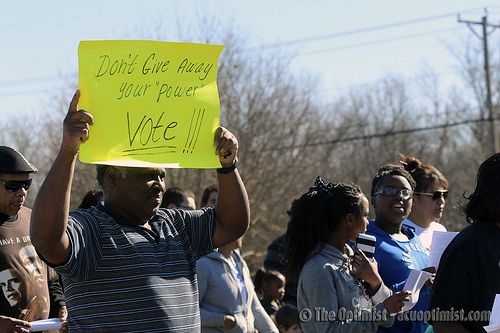One shot took his life, but Dr. Martin Luther King Junior’s vision stirs Abilene residents to keep striving for a better future. Two hundred people gathered Monday, Jan. 20 to share prayers and honor King’s vision by walking across the bridge of East Highway 80 which bears his name.
Trevor Thompson, New Testament instructor, said he was encouraged by the weather and the turnout.
“It’s a beautiful day, to see so many different people from different parts of the Abilene community and the ACU community here to express solidarity for a common cause and a common dream,” Thompson said.
Abilene resident Earthel Bowns said Martin Luther King Day is more than a remembrance of King, but a reminder to never stop fighting for the rights and equality of all races.
“It is representative of what he stood for and what his teachings were,” she said. “And that we are still progressing and still advocating the things he stood for.”
Even after 46 years since the assassination of King, the improvement of the people’s rights has not reached completion, some attendees said.
“The dream is still very much in process,” said Thompson. “I would love to say the goals, the ideas and the visions for the way human beings should treat each other, that he had, would come to reality. The truth is that there is still a lot of work to be done.”
Before the march began, Abilene Mayor, Norm Archibald, and Dr. Paul Fabrizio, vice president for academic affairs at McMurry University, spoke about the honorable life King lived.
The young and old began lining up to prepare for the walk. Many stood behind a rainbow-colored flag and banner with King’s name printed on it. The people were united as one as songs were sung and stories shared of Martin Luther King Day.
“We continue to try to live into his dream,” said Thompson. “Although racism isn’t as overt, perhaps as common as it was once was, subtle forms of racism, subtle forms of exclusion continue to exist and have a pernicious effect on the members of our community.”
Richard Green, who is black, and his wife Katie, who is white, said they still face hardships in their daily lives because of their interracial marriage.
“It is a lot better than it used to be, but we still experience the occasional stares in restaurants and public places,” said Richard Green. “Some family members on both sides, I won’t say accepting, but haven’t gotten used to it.”
Many interracial marriages and families face the same difficulties as the Greens. Although not everyone is accepting of the converging of race, the community believes time will show changes for the better.
“It seems like the younger generations are more accepting,” said Katie Green. “There is still some places where the older generations are not outwardly accepting of it, but they do stare at us.”
King’s message for equality is not a dying dream, but has created many opportunities for all races today.
“Us being a possibility is an opportunity that wasn’t possible before,” said Richard Green. “If those steps weren’t taken, I would never have had this beautiful women by my side.”

